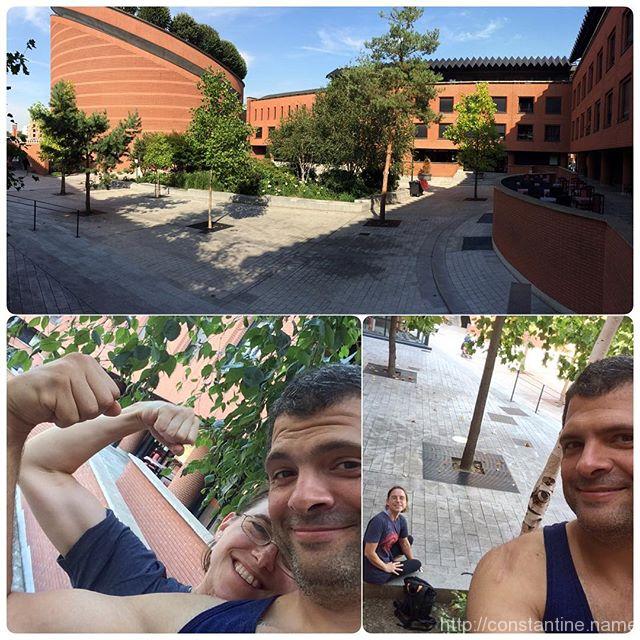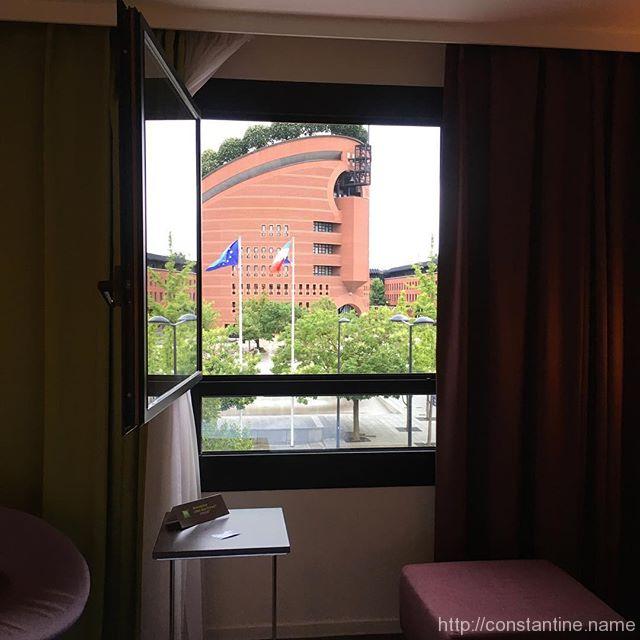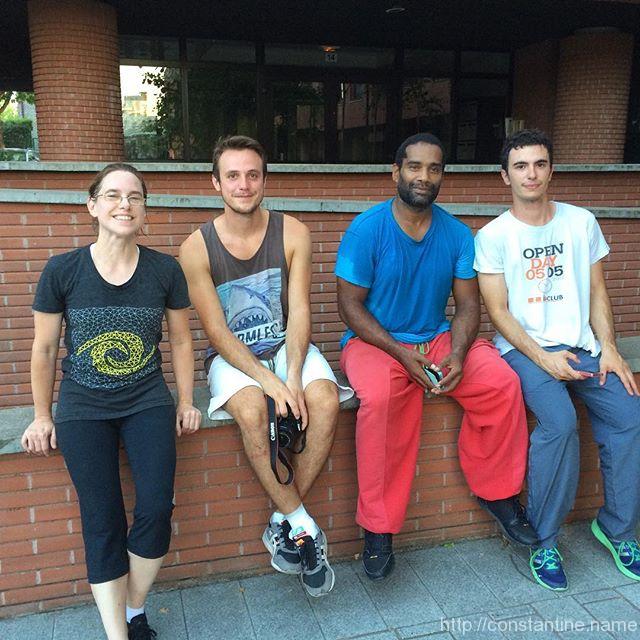Spent all day here… push bend jump qm run vault parkour all the things!!! One more ‘section’ to go as soon as our training partner returns from a coffee run.
ɕ

Spent all day here… push bend jump qm run vault parkour all the things!!! One more ‘section’ to go as soon as our training partner returns from a coffee run.
ɕ
I just finished listening to an interview with Stephane Vigroux (see, 1, 2, 3, and 4) and one of his take-aways—the point he ended with actually—was that your parkour practice should make you happy. If I may unpack a bit: That you should be kind to yourself.
Stephane teaches a drill which has many variations, but is roughly to spend 30 minutes balancing on a rail. One finds something reasonable to balance on, like a simple railing or a low bar, where falling off has no consequences and where it’s easy to re-mount. When balancing, simply stand as still as you can. Switch legs and positions as you need to, but mostly, simply stand still and balance. If you fall off, simply get back on, and be kind to yourself for the duration.
Go do this drill. Seriously. If you cannot balance on a railing, scale the challenge down to fit your ability; Find a narrow wall, a curb, something the size of a shoebox, a bench—whatever, and alternate balancing on one foot at a time.
I’ve had the chance to train with Stephane a few times. Once, in Évry France (right in front of the Cathedral) a large group was being led by Williams Belle through a long sequence of ground movements. I had arrived at the event from another week-long event, in the middle of a summer after I had recently given up a year-long physical challenge that had my left shoulder with an aching weakness. It was only mid-morning and I was grinding my way through the physical training. There was a tremendous group spirit of support and encouragement, with everyone—absolutely everyone being pushed to their own personal limits. There was shouting and cheering and a good bit of laughing.
I could have continued. It’s possible that every other time I had ever done physical training I did continue. I had struggled through the, “this hurts I want to quit,” rationalization much earlier that morning. But for some reason, at some random moment, I stood up and walked off to the side where I sat down on an outdoor chair in the shade. At that moment, it felt right to choose to be kind to myself rather than persevere.
After a few minutes, Stephane also stopped, walked over, sat down in a neighboring chair, and asked how I was doing. It wasn’t an, “are you injured, why have you stopped?” visit. Just a friend dropping by to see how I was feeling.
ɕ
(Part 2 of 4 in series, The interviews from my perspective)
The conversation with Mandy was the first time I tried simply recording a long conversation, which we published with almost zero editing. I had been talking to people on our team about trying this form of recording, but at some point, you just sort of have to jump in the pool.
I don’t remember where or when I first met Mandy. I don’t remember if someone said, “you should interview Mandy.” “Who?” “Mandy, over there— here, I’ll introduce you.” …or maybe we first met training. I really don’t recall. But I do recall that after a conversation we were like, yeah, let’s do an interview. At some point. Somewhere. Some when.
Then a few more conversations. Then a few stories at Gerlev, and then we were at the 3rd Évry Move event and we kept saying, “we should make time for an interview.” So after dinner one evening, we kicked our feet up in a hotel room overlooking the fountain in front of the Évry Cathedral.
…and talked for more than two hours trying to decide what to talk about in her interview. Two terrific hours of great conversation. We kept looking out from the 4th floor, with the big window swung open wide to the warm night, and thinking, “This is Évry. We’re just casually chatting about communities and life and everything… in the middle of Évry.”
…and the huge water fountain in the plaza sounding like a waterfall.
…and we really should press record soon.
“…ok, so, we’ve now been talking for 2-and-a-half hours. We should probably press record soon.”
Finally, I was like, “fuck it. ready?” and I hit record. Then we talked for another two hours. We recorded this sleep-drunk rambling conversation, and the whole time I’m thinking, “this is going to be so bad. No one will ever want to listen to this.”
Weeks later, I finally listened to it.
There’s a team of people behind the podcast and they always want to know how each interview went. I bet you’ve heard the phrase, “like pulling a rabbit out of your hat,” used when—with a touch of panache—you manage something akin to snatching victory from the jaws of defeat.
ɕ
What motivates individuals to embark on journeys that are deeply personal, yet intricately tied to the people and communities they encounter along the way?
Mandy Lam dives right into discussion about her travels, the characters she’s met and communities she has visited. She and Craig discuss the ethos and spirit of Évry Move, where they sat down to talk, as well as their experiences with the Yamakasi. Mandy also shares her thoughts on what makes a good community, the importance of solo training and self reflection, and finally gets around to discussing her major concussion.
It’s always the people. Even from the beginning, before my trip, it was always about the people.
~ Mandy Lam (7:34)
This conversation is a free-flowing discussion that centers on the intersections of travel, community, and personal growth. The dialogue reveals how connections with people—rather than places—become the driving force behind journeys. It highlights the serendipity of meeting individuals who profoundly shape one’s experiences and offers reflections on how cultural practices and storytelling enrich these encounters.
The discussion also examines broader themes such as how physical practices like Parkour serve as a medium for forming relationships and navigating personal narratives. It touches upon the challenges and rewards of creating and participating in events that foster community, drawing from specific examples like the North American Women’s Jam and training gatherings in Europe.
Takeaways
The essence of travel — Experiences are shaped more by the people encountered than the destinations themselves.
Curiosity as a driver — Following personal curiosity leads to deeper connections and richer experiences.
The power of communities — Communities often transcend geographical and cultural boundaries, fostering inclusivity and shared purpose.
Storytelling and connection — Sharing stories serves as a bridge between individuals and cultures.
Importance of shared practices — Activities like Parkour create unique opportunities for collaboration and mutual growth.
Flexibility in journeys — Approaching travel without rigid plans opens space for unexpected, meaningful interactions.
Emotional resonance in events — Events focused on community foster deep emotional connections among participants.
Resources
Évry Move event — Annual gathering in Évry, France, focusing on community and physical training.
(Written with help from Chat-GPT.)
ɕ

Hello Evry France!
ɕ

She spent today in Evry chasing a familiar face!
ɕ